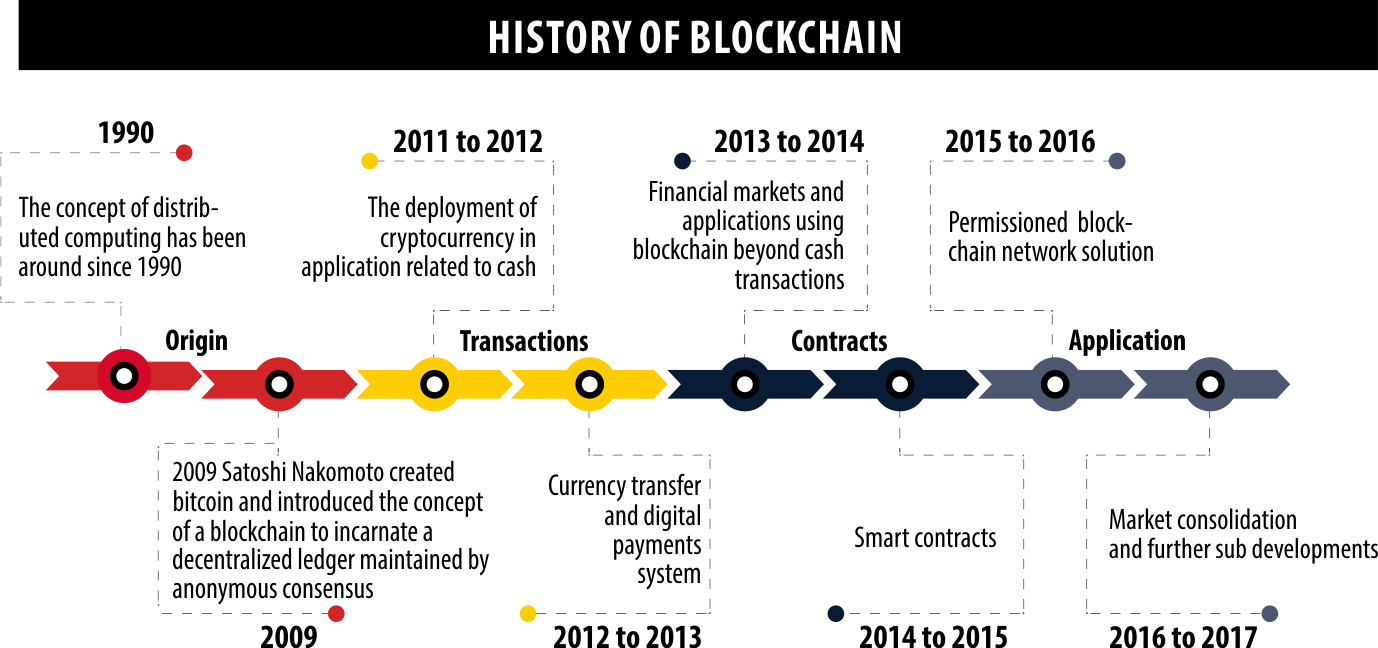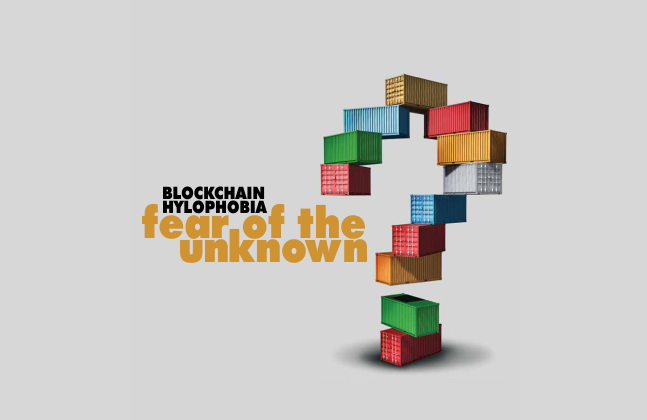Logistics and supply chain is the latest sector which is fast adapting and ready to experiment with its business model by implementing blockchain. The assurance from blockchain technology to find solutions to legacy issues and improve efficiency of existing business models has helped it to gain momentum. Every narrative has two sides to it, and can blockchain deliver what it promises?
There is a lot of hype and enthusiasm around blockchain technology, and it is fast expanding its presence across verticals in various sectors. From government to private organization, farming to aerospace, transportation to healthcare, the popularity of blockchain is constantly on the rise. The success story scripted by e-commerce sector, and peer-topeer ridesharing and taxi aggregator models have shown the way how technology can work as a great enabler to overcome physical infrastructure challenges in complex and difficult markets like India. The reason for which without physical presence these business models have been successful is traceability and trust which has helped them to retain customers.
Sectors like logistics and supply chain that have been battling with legacy issues and inefficiency due to various direct and indirect interventions, seem to have found a roadmap to overcome all woes through blockchain. Due to lack of mutual trust among various stakeholders in the logistics sector and hesitation to operate in a transparent and open environment, the outcome has been duplication of information at various levels making it difficult to implement traceability model at times when something goes wrong during transit of goods. The assurance of blockchain model to overcome these difficulties has earned itself lot of fan base even among government agencies which traditionally hold a conservative approach to change. Logistics and supply chain is ready to experiment with its business model by implementing blockchain technology.
Is blockchain the key!
Blockchain Council sees lot of potential in logistics by enabling the technology. The reason for which logistics sector has pinned great interest in blockchain model is due to the enhanced security benefits of blockchains that could potentially save corporations billions of dollars every year, explains the council. Additionally, blockchains help ensure that products that are received by the end user are tamper-proof. A blockchain is nothing but untamperable repository of data, and it is the very reason for which government and private entities are keen on it. In simple terms, a blockchain is like the safe deposit of a bank locker, which requires keys of the banker and the customer to open it. To change any information stored on the ledger (read blockchain), all the members involved in maintaining the ledger have to agree to make the change. Hence, it creates a model which requires trust and exchange of information which has been so far missing in the logistics space. Blockchain Council interprets the platform to be provider of better transparency, enhanced security and greater scalability.
Can it work!
Indian logistics sector prefers to work in silos, and the fear that information shared by one might be passed on to a competitor has compelled organizations from sharing data. The question arises in such an environment can blockchain model make a mark in India since blockchain stresses on open and uniform platform and sharing of information.

John C. Monarch, CEO & Founder, ShipChain, a decentralized supply chain and logistics platform that is leveraging on blockchain technology, explains, “In many ways, blockchain is the perfect antidote for ‘emerging market inefficiencies’. For example, using ShipChain’s open schemas for describing shipments, vehicles, operators, cargo and document types (and an open document retrieval protocol for reading/writing data with granular permissions), everyone who is authorized to see the shipment data has access to the complete picture. They can see where the shipment was delayed or lost, how long and where it was warehoused during transit, how long it traveled between handoffs, and other critical shipment data.”
There’s no way to fabricate the data, like there is with pen-and-paper, so if shipments are consistently being held up by a certain company, shippers can penalize them. The same principle applies to problematic routes, border crossings, and other bottlenecks. The platform empowers logistics managers to make smart decisions and eliminate inefficiencies by pinpointing their pain points and pointing towards solutions. Companies operate in silos because they are protective of their sensitive data, and other proprietary information. It gives their business a competitive edge. It is the very reason which makes blockchain attractive in logistics industry, elaborates Monarch. Blockchain allows companies to collaborate without putting their sensitive data at risk by means of giving the freedom to organizations to set their terms.
Companies share only the information which they have agreed to beforehand and can only share it with authorized participants of the specific shipment. Due to which it promotes collaboration, which results in improved outcomes. Second, it rewards efficient companies. In the conventional model, companies are able to get away with sub-standard operations because their customers are not able to know the cause for any delay or mishandling of a consignment. But blockchain model would make companies more accountable. Due to the traceability, if a time-sensitive shipment is stuck in a warehouse somewhere, the shipper would know about it. In a transparent environment, if the industry standard is fully visible across the supply chain, companies will adapt and improve their services to attract customers.
It is apt for anyone to ask why do the freight forwarding industry need blockchain. A normal supply chain system can also do the same thing ! Answering to this perennial question, IBMBlockchain explains, “The thing that differentiates a blockchain supply chain and a normal one is the consensus that must be reached between all parties involved. So if one person says something changed and the other two parties disagree, the ledger isn’t changed since there wasn’t a consensus.”
One might think that turnover time will increase to get the consensus of all participants of a blockchain, but since it’s all done digitally and doesn’t require human interaction so the process will remain well within control and delaying party will be answerable.

Examples where blockchain made a mark Stefan Kukman, CEO, CargoX, explains that the technology itself – if public blockchain networks, such as Ethereum Network, are used – provides an immutable, secure, reliable, and unhackable infrastructure for gathering, transferring, and analyzing global and local data of any kind. All partakers can be sure that nobody else could tamper with the data itself, as the public blockchain is the safest technology to transfer and safeguard data.
In other cases, such as for example the CargoX Smart B/L™ blockchainbased Bill of Lading enables to create and transfer the ownership of Bills of Lading with the help of public blockchain to other partakers on the other side of the globe within minutes, without the need to use expensive and slow courier services. And the document itself is safely stored and encrypted, and the blockchain provides the functions of having the ownership of the document stated clearly and irrevocably.
Barriers to widespread Blockchain adoption Lack of standardization is one of the major hurdles for the wide spread adoption and realization of the true potential of the blockchain. Being a new and evolving technology, blockchain is yet to establish its proven track record tested over a long period of time. While many are talking about the expected prominent impact it will have, blockchain’s power is still uncertain. At the same time, the blockchain market has very few standards or industry specifications for the adoption and use of the technology and hardware.

Soeren Duvier, Managing Director (Asia), BiTA explains that for blockchain systems to succeed, all constituents of a blockchain must agree to the characterizations of their data. For example, what details will every bill of lading, proof of delivery or invoice contain? And what actions should trigger if data is missing or not validated? Developing and maintaining the software and hardware required to run blockchain technology is expensive. Additionally, companies need technically qualified people to run blockchain technology, which can be a significant cost, especially for small- and medium-size businesses. Legacy system integration is another grey area to implement blockchain. Companies must integrate blockchain technology into their legacy systems. According to Nasdaq. com, “Many organizations are reluctant to make a move to blockchain solutions because of the meticulous planning, time and money that would be required to achieve successful company-wide implementation.”
Stefan Kukman, CEO, CargoX furthers underlines the threat that if a company uses the public blockchain – as opposed to using “private blockchain” that can be tampered with by the centralized owner! – the takeaways are really great: the public transactional infrastructure lowers the need to implement corporate servers and administrators, it provides great data security by default, and the data archive is always available to the parties authorized to view it. The immutability of the public blockchain also means that it is never offline, always operating at the optimal pace ensured by the technology design. Transactions take place in a reasonable amount of time.
Among the risks and difficulties, the major one for sure is the risk of “not owning” the infrastructure, which sometimes can clash with corporate policies – but those who trust the cloud services, must also trust the public blockchain. There is also the risk of trusting a private blockchain, as this basically can mean that one single company owns the complete infrastructure, and this might enable it to manipulate the data or tamper with the infrastructure itself as the company sees suitable.
Improvements are easy to make, when you have a database that is always valid and where events are time-stamped with great accuracy. So, in theory, if you implement a blockchain-based platform, everybody who is authorized can see where the bottlenecks form, and help optimize workflows so that the processes run with greater speed and smoothness. Having such great all-round transparency can always be an issue and there might be partakers who do not want that implemented, but in general companies and other institutions can benefit greatly from having such 3600-overview of their processes.
What about those who work in silos
Blockchain seems to have something for the companies who want to work in silos. Every silos can implement their own blockchain-based solution and the management can always gain better transparency and visibility of their Key Performance Indicator (KPIs). What the blockchain itself brings, is that the data can never be tampered with. Also, every silos does need to connect with other entities through various processes – and these processes can always be blockchain based.
Blockchain hylophobia
At this juncture, one can only speculate whether an open and transparent platform like blockchain can actually be widely accepted across the industry. Bitcoin is another example operating in the lines of distributed ledger model, and the hype around bitcoin is still resounding. Owing to the speculation, the Indian government stamped it illegal to trade bitcoin in the country. A little learning is a dangerous thing, and lack of clear understanding can make things worse.
Since industrialization, the last couple of decades have witnessed fastest evolution of technology. The lifespan of even the newest technology is getting shorter, and many innovations have become obsolete even before one realizes it.
Whenever a new technology comes to the market, and assures of taking care of prevalent challenges, it creates lot of excitement. As they say, first mover takes it all! So it finds lot of takers but there are certain sections of the market who have hylophobia about new innovations. The first obstacle for blockchain developers will be to clear the air of doubt about its capability. Unless it finds the mass market acceptance, it will be difficult to get the desired and holistic results. The logistics sector will continue to operate fragmented. But mass acceptance could only be achieved, when there is greater awareness about the benefits and challenges of moving onto a blockchain eco-system.
At the moment in developing markets like India where still lot of the process related to freight forwarding is done in bits and pieces and paper and manual intervention is the norm of the industry; it is going to be a herculean task to implement blockchain model on mass scale.

The freight forwarding industry lacks standardization and so do with blockchain as well. Various companies are developing blockchain platforms and it is very much required to introduce standardization on global scale. Since blockchain is in the initial stage, so it would be much easier to bring everyone on board than at a later stage. It could only be possible by bringing all blockchain developing firms under the supervision of one umbrella organization.
In the early 90s when Internet was not accessible to all and the understanding was even lower, it had very limited spheres of productivity. The real change came when internet became accessible to a whole lot of people and now it has reached a level where it has far greater implications on the society at large and has changed the way business and living is done. If blockchain needs to get the desired results which it propagates, the understanding of the technology needs to spread much beyond CIO and CTOs and the incubation centers.
Blockchain is yet to prove its deliverables, and a large part of its capability needs to stand the test of time. In such circumstance it would be inappropriate to claim that blockchain is the solution to all inefficiency woes faced by freight forwarding sector. So instead of getting all the processes moved onto the blockchain bandwagon, it would be wise to go in a phased manner. And blockchain developers should keep this in mind. Gradual building of confidence has far greater and far reaching implication. Successful companies can be even more successful by using innovative technologies like blockchain but it is ok to ignore it if it doesn’t have understanding of the technology. Instead of losing out by getting onto an unchartered territory, it is wise to stay out of it. But companies also need to keep in mind that gradually everything is moving onto the online platform and one can’t stay relevant if it continues to ignore it. So those who are averse to innovation must be alert of development taking place in the blockchain space before it becomes too late for them to catch up with competition.
Before jumping onboard a blockchain platform, freight forwarding companies first need to hire the right resources to understand the model first. In India use of technology and spending for R&D and innovation is almost non-existent, so in such case one couldn’t reap the full benefit of blockchain if they don’t have the understanding of it. If technology and innovation is not in the DNA of a company, it must first develop it then move onto the next level. The technology companies that offer blockchain platform, the freight forwarding companies which are going to be part of it and the end users be it shippers or anyone else in the value chain need to carefully tread on a territory which is new to them and there needs to be space for accommodating little bit of exception.
Applying innovative technology to do business or doing business through innovative ideas and business models, or using both of it; in either of the cases companies can be successful. Now it is up to an organization what it chooses!








